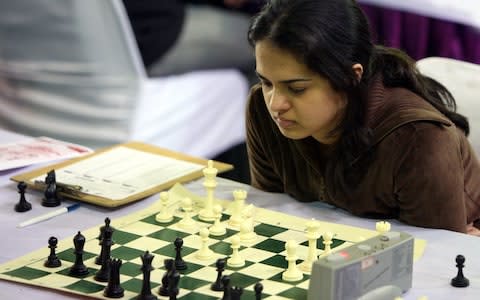Tania Sachdev: the female Grandmaster making moves in the 'man's game' of chess

There’s a YouTube video of Tania Sachdev aged seven, from a programme called The World This Week on India’s NDTV. She’s at the well-apportioned family home in Delhi, recently returned from winning her first international chess tournament in London.
She’s a bouncy, energetic little girl, shown combing the hair of a Barbie that’s seen better days, then prancing joyfully along to a Bollywood soundtrack, her arms a dizzy whirl. You see it even then, though, the change that comes over her as soon as she sits in front of a chessboard. She grows suddenly still, focused, her large eyes solemn and unblinking.
The video shows interviews with her good-naturedly bemused parents and with her chess coach, but it’s the contrast that stays with you – between the ebullient, dancing child and the stern chess player.
Twenty four years later, Sachdev has fulfilled that early promise, becoming one of the leading female chess players in her country, a Woman Grandmaster and an International Master. She won the Reykjavík Open and Commonwealth Chess Championship in 2016.
She’s in London to work as a commentator for the Chess Classic, a star-studded event that kicks off at Google’s DeepMind HQ on 1 December and continues at Olympia. The event features prize money of £228,000 and will bring the year’s Grand Chess Tour to a conclusion. Among those playing will be the prodigiously talented Norwegian Magnus Carlsen, who became a Grandmaster aged 13 and World Champion in 2013 at just 22 (he is also a sometime model).

I meet Sachdev in a Notting Hill café a few weeks before the tournament is due to begin. I half-recognise her from the YouTube video: there’s still some of that boisterous energy, her smile and winning laugh bubbling up throughout our conversation.
In a sport whose players are not known for their social skills, Sachdev is a striking exception. She speaks fluently and intelligently about the game and has carved out a side career as a commentator and talk-show guest in her native India. I ask her about how she came to take up a sport whose female players remain in a minority, particularly in India.
‘It started with my father,’ she says, grinning at the memory. ‘He didn’t know how to play, but he taught himself from one of those instructional booklets that came with a set we were given. It’s funny because he first tried to teach my older brother how to play.
'I guess he didn’t think that a five year-old would be interested, but I sat there watching them and I thought that it looked like a really interesting game. I picked up the rules, and two or three days after that I asked my dad for a game and I beat him.’
Chess in India was going through a special moment just then – Vishy Anand had become the country’s first Grandmaster in 1988 and would go on to be World Champion. Delhi had almost no chess culture, though (Anand is from Chennai), and Sachdev’s parents initially saw chess as just another hobby for their daughter.
‘They thought, “Why not encourage her?” I was already having dance classes and art classes, and had zero talent in any of them. A friend of my parents came over and started giving me lessons once a week, and he said, “There’s something interesting here.”’

Soon Sachdev was playing in – and winning – national tournaments. Then came the trip to London, a surprise victory, and India had found another chess hero. Even in a middle-class family – Sachdev’s father is a successful interior designer; her mother trained in fashion – it was unusual for a child to be encouraged to take up sport (as chess is classed) for a living.
‘I was very lucky,’ she tells me. ‘Sports were seen as supplements to your academic life, a way to get into a better university. Luckily I had parents who loved sports.’ It was even less usual for a girl.
‘It’s the case in India that economically if parents are only able to support one child then that’s usually the boy. I was a special case because I was brought up in an environment where there was no sense of difference between being a boy or a girl. We were just encouraged to pursue things that interested us. It helped that both of my parents were sportspeople themselves. My dad was in his college football team and my mum played badminton for her state.’
While Sachdev has consistently ranked in the top 50 worldwide in the women’s game, she’s 2,216 in the combined male and female chart, a stark illustration of the discrepancy between the sexes in a sport that one would think offered more scope for equality than most.
People say, 'That was such a girl move to have made'
It used to be said that chess was simply more suited to the ‘male mind’, that women operated at some deep intrinsic disadvantage. Sachdev has a more convincing explanation: centuries of conscious and unconscious bias, combined with a contemporary chess scene that is riddled with sexism.
‘There have been many comments made to me in a joking way,’ she tells me, ‘but they all contain this underlying current of saying that women do not make great chess players. They’re said over a glass of wine, or over dinner, and it’s subtle, but it’s always there. You get someone saying to you, “I would never have made that move. That was such a girl move to have made.” It happens to me continually and it’s hard not to let it get to you.’
A post shared by taniasachdev (@taniasachdev) on Nov 8, 2017 at 10:28pm PST
Sachdev recognises that this toxic atmosphere has prevented many girls from taking up the sport in the first place, and will have persuaded many already in the game to give it up.
‘A lot of women players have probably quit because they don’t want to deal with this negativity around them. It’s really sad. But of course it happens in other workplaces, and the women who make it despite these things have a real strength of character.’

At least, Sachdev says, chess no longer carries the taint of nerd-dom. ‘It’s way cooler now to be a chess player than it ever was before. Parents are recognising it doesn’t matter whether your son or daughter is going to play chess professionally; they’re putting their children into the game because it advances cognitive skills for whatever you choose to do in life.’
Sachdev’s mother runs a charity in India that takes chess into deprived areas, focusing particularly on teaching children the sport. It mirrors something that Sachdev’s friend (and The Telegraph’s chess columnist) Malcolm Pein is attempting in the UK.
There is increasing evidence that chess improves everything from problem-solving skills to behaviour, and Pein’s Chess In Schools And Communities organisation has achieved extraordinary things in bringing the sport into the lives of thousands of British children.
‘There are some really cool things that are happening here, both at the highest level and in schools,’ says Sachdev. ‘Britain is hosting events and tournaments that capture the world’s attention, putting chess out into the media, getting young people involved, bringing more and more people into the game.

‘You don’t have such a strong tradition of chess in this country but with what Malcolm is doing, and the way chess is being taught in schools, it’s suddenly everywhere. And you only have to look at Norway, which has no history of chess, and they produce Magnus Carlsen. Now it’s the only country in the world that shows chess on its national broadcaster. The whole country loves chess.’
I’m fascinated by Carlsen, a cool, handsome, enigmatic figure. I ask Sachdev how much she mixes with other players on the tour. ‘I have more friends on the tour than I did in Delhi,’ she tells me. ‘Although whenever chess players socialise we only ever talk about chess.’
As for Carlsen, she knows him well. ‘I think he’s an absolute genius. I’ve met him many times and at many tournaments. He’s one of the best World Champions that we’ve had. Up there with Bobby Fischer and Garry Kasparov and, of course, Vishy Anand.’
Sachdev has grown up in the highly pressured world of professional chess, the weight of a nation’s expectations on her shoulders since childhood, yet seems almost preternaturally well adjusted. In 2014 she married a Delhi architect, Viraj Kataria, whom she’d met at a party two years earlier. Kataria is Hindu, Sachdev Sikh, and she tells me that marrying relatively late, and for love, was one of the benefits that came from her unusual upbringing.

‘I know that if I wasn’t a chess player, I probably would have had an arranged marriage at 23 or 24. Chess has given me the opportunity to explore so much more within myself and out in the world.’
She also attributes her coping skills to the influence of her mother, who accompanied her everywhere on the world chess tour until she was well into her 20s. ‘She’s a strong woman. You don’t mess with her; you don’t mess with her family.’
It wasn’t always easy, even with such support. ‘In many ways it has been very, very tough,’ she tells me. ‘Growing up, I obviously didn’t have a normal school life, which at that age matters a lot. You don’t have friends around you – that’s hard. You’re training all the time. You have bad tournaments, and that’s difficult to deal with. There’s constant pressure on you. You know that your family is giving up a lot for you. Obviously, all this adds up to making things tough.’
You don’t get to sleep when you’ve had a bad game. It’s like a scar
The game itself is notoriously unforgiving. It takes a special kind of mind to play chess at the highest level, Sachdev tells me. An ability to block out the world, to attain an almost Zen-like state of detachment, to feel no regret or frustration, to concentrate not only for the first hour of a game (which is easy, she explains), but for many hours.
‘There have been months in which I haven’t had a good tournament. It’s there, and suddenly it isn’t. For example, 2016 was a great year for me. This year, I did win the Commonwealth bronze and I did win a medal at the Asian [Chess Championship], but it hasn’t been as great as 2016.
'Even today, after playing chess for 20 years, it’s damn hard. You don’t get to sleep when you’ve had a bad game. It’s like a scar. It’s a very solitary game in many ways because you’re absolutely on your own in your head.’
Tania Sachdev will be a commentator during the online broadcast of the London Chess Classic (1-11 December 2017; londonchessclassic.com)
Styling: Sophie Goodwin. Hair and make-up: Jess Summer Buckley at S Management


